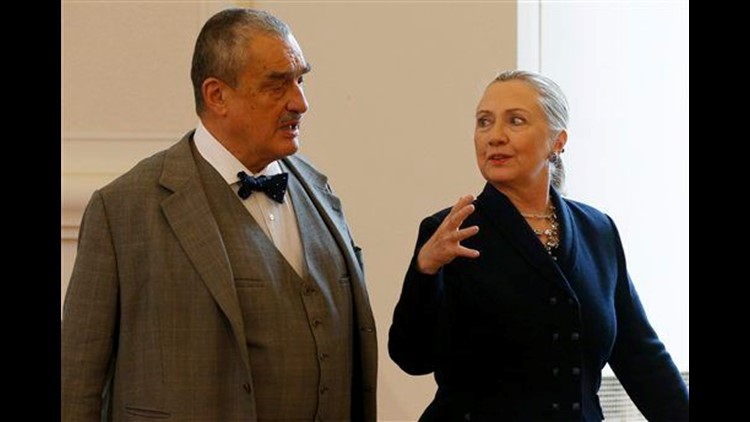PRAGUE (AP) — U.S. Secretary of State Hillary Rodham Clinton lobbied the Czech government Monday to approve an American bid for a $10 billion expansion of a nuclear power plant amid fierce competition from a rival Russian offer.
Clinton made her pitch for the American energy giant Westinghouse Electric Co. in meetings with Prime Minister Petr Necas and other senior Czech officials in Prague. Speaking to reporters, she stressed the need for the Czech Republic to wean itself off of a dependency on Russia for fuel.
"We are encouraging the Czech Republic to diversify its energy sources and suppliers," Clinton said. "Given how long-term and strategic this investment is, the Czech people deserve the best value, the most tested and trustworthy technology, an outstanding safety record, responsible and accountable management."
The Czechs get 60 percent of their oil, 70 percent of their natural gas and all of their nuclear reactor fuel from Russia. That leaves the NATO member highly susceptible to economic and political pressure from Moscow, which dominated the Central European country from the end of World War II to the fall of the Iron Curtain.
Revitalizing the Temelin nuclear power plant is a big part of the Czech agenda to radically boost its nuclear power production, defying global skepticism about the use of atomic energy in the aftermath of last year's meltdown at Japan's Fukushima plant. And the Obama administration is hoping to get some of the windfall by securing Westinghouse's bid. The project could generate 9,000 American jobs, U.S. officials said.
For the United States, the battle for the Temelin contract is an example of an increasingly prominent element of foreign policy: Going to bat for American companies. If this was once a less-promoted if widely understood element of private diplomatic relations, what Clinton calls "economic statecraft" has now become an endeavor U.S. officials proudly promote as part of their jobs-building effort for the United States.
"We are not shy about pressing the case for Westinghouse," Clinton said. "We believe that company offers the best option for the project in terms of technology and safety. It would clearly enhance Czech energy security and further the nuclear cooperation between our countries, and it would create jobs and economic opportunity for Czechs and Americans."
To make the case, Clinton and other officials are cautioning the Czechs about the dangers of again putting their energy future in the hands of Russia. They need only point to 2008, when Russia sharply reduced oil supplies to the Czech Republic immediately after a U.S.-Czech agreement on a missile defense installation. The Russians blamed the decline on technical problems.
Still, a consortium led by Russia's Atomstroyexport may win the competition to build two new reactors at the Temelin plant, amid American grumbling over alleged bribes. The Czech government is expected to evaluate the final bids in December and make a decision in 2013. The reactors won't be operational until around 2025.
Clinton is in Prague on the first leg of a five-day trip to Europe. From the Czech capital, she'll travel later Monday to Belgium. Further stops are scheduled for Ireland and Northern Ireland. Focuses include promoting human rights and democracy across Eastern Europe and Central Asia, and NATO support for Turkish efforts to beef up defense of its volatile border with Syria.
In Brussels on Tuesday, the alliance's members are likely to give formal endorsement to Turkey's request for Patriot missiles to help it respond to a series of Syrian rockets that have violated Turkish airspace. Five Turks have been killed. Decisions on how many batteries and where to deploy them will then be referred to national governments, said U.S. officials, speaking on condition of anonymity because they weren't authorized to speak publicly about NATO deliberations.
The U.S., Germany and the Netherlands are the probable providers. Each has experts investigating possible deployment sites near the border. But it will be weeks before any anti-missile batteries reach Turkey, the officials said.
Clinton also is holding private talks Monday evening with Pakistan's foreign minister and military chief to coordinate security and peace strategies in Afghanistan as the U.S. and its partners plan to withdraw most foreign troops through the end of 2014.
Copyright 2012 The Associated Press.



